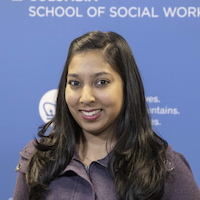What Overturning Roe v. Wade Would Mean
As we await the Supreme Court decision on Dobbs v. Jackson Women’s Health Organization, here’s something to think about.
As we await the Supreme Court decision on Dobbs v. Jackson Women’s Health Organization, here’s something to think about.
For the last 50 years, the constitutional right to have an abortion has been protected thanks to the 1973 landmark Supreme Court ruling in Roe v. Wade. Since Roe's passing, the anti-choice movement has mounted increasingly aggressive attacks on this fundamental and vital right to reproductive autonomy. These attacks, rooted in systematic racism and misogyny, have created barriers in abortion access for many Americans—especially people of color. The most recent, and dangerous attack was the May 2 leaked draft of the court’s majority decision in Dobbs v. Jackson Women’s Health Organization. If issued, this decision would overturn the constitutional right to have an abortion.
If the Supreme Court votes in favor of striking down both Roe v. Wade, and Planned Parenthood v. Casey (the two Supreme Court cases guaranteeing the federal constitutional right to abortion), the decision on whether to restrict or ban abortion will be left up to each state. Currently, 26 states have laws in place that will be triggered to ban or heavily restrict abortion if Roe v. Wade is overturned; 13 of which are prepared to enact outright bans on all abortion access in their states. Enacting laws to restrict or ban abortion only restricts access to safe abortion; the need for abortion will not disappear as states ban or restrict this medical procedure. With more than 50 percent of women in the U.S. living in a state hostile or extremely hostile to abortion rights, the impending news of the decision and its fallout poses a public health threat to the reproductive health and rights of all women and people capable of pregnancy.
However, the anticipated decision will not impact all women and birthing people equally; Black, Indigenous, Latino, and other people of color (BIPOC) have the worst access to contraception and the lowest-quality maternal care in the U.S., because of this country’s long history of racism and discrimination. The anticipated restrictions are expected to have an impact on states where there are more BIPOC populations living in poverty compared to states where abortion is expected to be protected (for example, Mississippi vs. New York). Because criminalization of abortion is expected, BIPOC populations will likely be disproportionately targeted for prosecution.This would be a disaster for BIPOC women and birthing people who are already disproportionately represented within the criminal legal system. While the current state of reproductive rights in the U.S. has left the most vulnerable BIPOC populations of women and birthing people with limited reproductive health resources, the elimination of federal protection of abortion will be devastating to BIPOC communities.
The final Supreme Court decision is expected any day now. If the court rules to overturn Roe, we must send a clear message that access to safe abortion is an essential component of comprehensive and necessary reproductive healthcare, and that leaving decisions on abortion access to states is an act of racism, targeting BIPOC communities, and creating a society of forced birth. Planned Parenthood and partners have launched a national campaign to bring together the millions of Americans who wish to mobilize and demonstrate support for federal protection for safe abortion. I urge those in search of agencies for donations to prioritize organizations serving BIPOC communities in the 13 states that are set to immediately ban or heavily restrict abortion if Roe is overturned.
As a scholar in her mid-30s, who has dedicated her life to improving the reproductive health of those most vulnerable, I have enjoyed the privilege of existing in a country with federal protections for abortion. Stories of people dying from unsafe abortions in the U.S. were just those—stories and experiences of the generation before me. These stories motivated me to use my skills as a researcher and scientist to help ensure that access to safe abortion and all reproductive healthcare was available to the most vulnerable populations, inside and outside the U.S. Now, as I wait for the Supreme Court decision with a pit in my stomach, I hope that I am able to draw from those experiences of the incredible advocates who fought for the right for this vital and basic reproductive right, and do my part in the fight ahead of us. I hope you will join me in this historic moment.

Anindita Dasgupta is an associate research scientist in the Social Intervention Group at Columbia University School of Social Work.
This column is editorially independent of Columbia News.
